
News
Behind the Headlines
Two-Cents Worth
Video of the Week
News Blurbs
Articles
Testimony
Bible Questions
Internet Articles (2015)
Internet Articles (2014)
Internet
Articles (2013)
Internet Articles (2012)
Internet Articles (2011)
Internet Articles (2010)
Internet Articles
(2009)
Internet Articles (2008)
Internet Articles (2007)
Internet Articles (2006)
Internet Articles (2005)
Internet Articles (2004)
Internet Articles (2003)
Internet Articles (2002)
Internet Articles (2001)

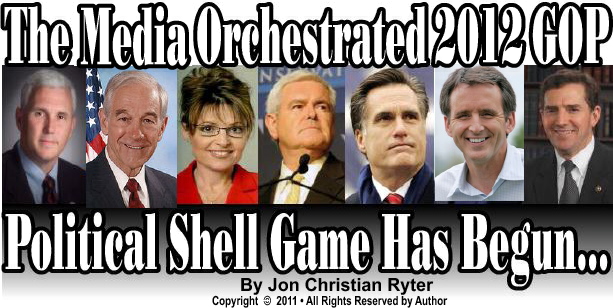
 he
annual Conservative Political Action Conference [CPAC] was held at the
Marriott Wardman Park Hotel in Washington, DC from February 10
to 12. Each year a virtually-ignored presidential straw poll is conducted
by CPAC for the attendees. This year,
the straw poll dominated the media's attention on Sat., Feb. 12 only because
the "winner" was 10-term Congressman Ron Paul [R-TX].
Dr. Paul ran for the GOP presidential nomination in 2008. Dr.
Paul won 35 delegates, but no States. He came in second in 10 States,
and third in 17 States.
he
annual Conservative Political Action Conference [CPAC] was held at the
Marriott Wardman Park Hotel in Washington, DC from February 10
to 12. Each year a virtually-ignored presidential straw poll is conducted
by CPAC for the attendees. This year,
the straw poll dominated the media's attention on Sat., Feb. 12 only because
the "winner" was 10-term Congressman Ron Paul [R-TX].
Dr. Paul ran for the GOP presidential nomination in 2008. Dr.
Paul won 35 delegates, but no States. He came in second in 10 States,
and third in 17 States.
Back to CPAC. There were approximately 11,000
attendees at this year's CPAC conference. Three thousand seven hundred
forty-two votes were cast in the straw poll. Ron Paul won 30% of
them. Former Massachusetts Gov. Mitt
Romney, who should have been the 2008 Republican presidential nominee,
came in second with 23% of the vote. Following him was former GOP vice
presidential candidate Sarah Palin with 7%; then New
Mexico Governor Gary Johnson (don't forget that name) with 6%.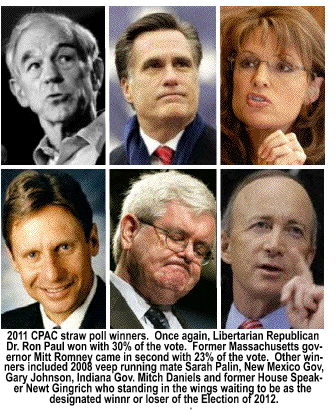 We'll be right back to him in a moment.) Also snagging 6% were New Jersey
Governor Chris Christie and Minnesota governor Tim Pawlenty.
Former House Speaker Newt Gingrich and Indiana Congressman Mike
Pence came in next with 5%; Michele Bachmann and virtually
unknown Indiana Gov. Mitch Daniels, with 4% each. Godfather's
Pizza owner Herman Cain, Mike Huckabee, former Pennsylvania
US Senator Rick Santorum, and Sen. John Thune, each received
2%; with former Ambassador Jon Huntsman, Jr. and Gov. Haley
Barbour each receiving 1%. I expect a lot of the Young Republicans
who donate their time to many of the exhibitors at CPAC were from Indiana,
and cast their votes for Daniels, or they were from Utah and cast
their votes for that State's favorite son and former Governor, Jon
Huntsman. Or, they are libertarians or Texans—or both—and
cast their straw ballots for Dr. Paul.
We'll be right back to him in a moment.) Also snagging 6% were New Jersey
Governor Chris Christie and Minnesota governor Tim Pawlenty.
Former House Speaker Newt Gingrich and Indiana Congressman Mike
Pence came in next with 5%; Michele Bachmann and virtually
unknown Indiana Gov. Mitch Daniels, with 4% each. Godfather's
Pizza owner Herman Cain, Mike Huckabee, former Pennsylvania
US Senator Rick Santorum, and Sen. John Thune, each received
2%; with former Ambassador Jon Huntsman, Jr. and Gov. Haley
Barbour each receiving 1%. I expect a lot of the Young Republicans
who donate their time to many of the exhibitors at CPAC were from Indiana,
and cast their votes for Daniels, or they were from Utah and cast
their votes for that State's favorite son and former Governor, Jon
Huntsman. Or, they are libertarians or Texans—or both—and
cast their straw ballots for Dr. Paul.
Huntsman doesn't stand a prayer of getting within shouting distance of the nomination even though, like Romney, he has the financial resources to run a privately-financed campaign from start to finish. Like Romney, Huntsman is also a Mormon. That means the two fiscal conservatives who would be most likely able to restrain spending cannot run on the GOP ticket together. They would be repudiated by every Christian talking head in the country as a presidential team—just as Romney was in 2008. GOP Christian conservatives opted for those they viewed as mainstream "Christian candidates" like Tom Tancredo or Mike Huckabee.
Huckabee's credential were somewhat
tarnished by Arkansas politics. But the media never brought up the fact
that, like the Clintons, Huckabee had climbed into bed with
both Tyson's Foods and Walmart. Why? Because the mainstream media
knew that Huckabee was in the race to play spoiler and drain votes
from Romney to make sure the establishment Republicans' "designated
loser" for 2008—Senator John McCain—won the nomination.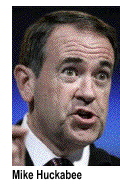 If Huckabee's credentials to run for the presidency were sullied,
he would be forced to drop out of the race, leaving a two man heat, with
McCain pulling only about 30% of the vote he won throughout the primary
season, but with Romney pulling enough of the remaining votes to
create an open convention in St. Paul which would have denied the nomination
to McCain. Huckabee would likely have cut a deal with Romney,
and we would have seen a Romney-Huckabee ticket which enough moderate,
Reagan-Democrats would likely have supported to flip the outcome
of the 2008 election.
If Huckabee's credentials to run for the presidency were sullied,
he would be forced to drop out of the race, leaving a two man heat, with
McCain pulling only about 30% of the vote he won throughout the primary
season, but with Romney pulling enough of the remaining votes to
create an open convention in St. Paul which would have denied the nomination
to McCain. Huckabee would likely have cut a deal with Romney,
and we would have seen a Romney-Huckabee ticket which enough moderate,
Reagan-Democrats would likely have supported to flip the outcome
of the 2008 election.
McCain, who knew he was going to have to come back in 2010 and win reelection to the US Senate, couldn't afford to be branded as a loser in Arizona. Which is why he picked completely unknown, first term Alaska Gov. Sarah Palin as his running mate. A political novice, McCain's handlers knew Palin would be a lightning rod that would attract controversy—and the blame—for McCain's loss in November, 2008. McCain just never realized Palin would become the conservatives "sweetheart" overnight. Palin's "from the heart" plain talk won over the American people and overnight, McCain's polling numbers skyrocketed. From that point, Palin was attacked by detractors on both the right and the left.
The vote drainers who won nothing but Romney votes in 2008 were Ron Paul, Fred Thompson, and Duncan Hunter. Rudy Giuliani pulled his votes from McCain. That's why he was the first to pull out of the race. Five announced candidates in 2008 actually pulled out of the race before New Hampshire since each of them were serious about winning the nomination and not playing spoiler-on-the-street for matching funds. They were UN Ambassador Alan Keyes, former Gov. Tommy Thompson [WI], Sen. Sam Brownback [KS]. former Gov. Jim Gilmore [VA] and Congressman Tom Tancredo [CO]. Establishment politics was so distasteful to Tancredo that not only did he drop out of the presidential race, he also declined to seek reelection for his congressional seat as well.
Okay...now, back to former Governor Gary Johnson. At the Republican Liberty Caucus National Convention in Arlington, VA on Feb. 12 (the same day as the CPAC straw poll). Johnson handily won their 2012 presidential straw poll. In fact, he received twice as many votes as the second place winner—Congressman Ron Paul. And, he won six times the number of votes received by former House Speaker Newt Gingrich [R-GA], who came in third. If there was any scientific logic in the straw polls, then polls taken on the same day about 30 miles apart, would have similar results. In other words, if Dr. Paul's winning the CPAC straw poll was indicative of how Americans actually felt, then he would have also won the Republican Liberty Caucus National Convention straw poll by a reasonably similar margin. He didn't because straw polls mean absolutely nothing—except for bragging rights by possible candidates, and to skewer the reality of which candidates are actually viable. Which, of course, is why the Huffington Post jumped all over the CPAC straw poll. The Huffington Post quoted Human Events Online, noting that Dr. Paul also emerged ahead of the pack in CPAC's straw poll last year, too. And, that means...what? Politico, also known for its liberal slant, noted that the anti-Fed congressman bested both Mitt Romney and Sarah Palin (who did not attend this year's CPAC conference)
Interviewed by CNBC's Squawk Box on Monday about his "win" at CPAC, Dr. Paul said "...it is significant, and it does get me excited." He added that he was a bit surprised that he won, but said the poll is "...a good indication that maybe the sentiments are changing..." Okay. Let me get this straight. He won last year. He won this year. How are the sentiments changing? Then, Dr. Paul confirmed what I have already said: "The young people (those who come to work in the booths of the exhibitors) are very interested in this. They turned out. They generally turn out at CPAC meetings..." [Dr. Paul's anti-Fed advocacy] "...is not the conventional wisdom of the old Republican Party conservatism. I think something new is coming along...The Republican Party and the other leaders in this country need to wake up and find out exactly why the young people are sick and tired of what is being dumped on them politically and economically."
Dr. Paul got that much right. But, it's not just the Young Republican student advocates of libertarian causes who worked the booths and cast the ballots in the straw polls at CPAC who are tired of being dumped on by slick talking politicians who promise one thing and deliver another. The voters—both working class Republicans and Democrats—are tired of politics as usual in Washington, DC. The voters have awakened. And, they don't like the wide-awake world between the two "big white buildings" on opposite ends of Pennsylvania Avenue, nor do they like the well worn path between both of those buildings and the offices of K Street lobbyists.
The problem with Ron Paul is that 99.5% of those who vote Republican view him as the Ralph Nader of the right—a important voice on fiscal issues, but too polarized to actually win a presidential election and unite a nation.
When you look at the 169 million registered voters in the United States in November, 2008, you find that approximately 85 million of them were registered Democrats, 54 million were registered Republicans, and 28 million of them were registered Independents who usually vote left of center. What does that tell you? It says the odds are 6-out-of-10 that the voters will elect a Democrat, or someone left of center not only in Congress but in the White House. The farther right of the political centerpost you get, the less chance you have of being elected either to the US Senate or the White House. As iconic as Ron Paul is in Texas, it is unlikely the 75-year physician could actually win Sen. Kay Bailey Hutchinson's Senate seat in 2012, let alone win the presidential race although the odds of him winning her seat are ten times more likely than his ever winning the presidential nomination. The starting gate in the presidential race is just too far from the centerpost where presidential races are won and lost..
I find it puzzling that Conservative America has not yet figured it out. Or, why or how, they can simply ignore something so important when the primary seasons begin. Spoon-fed political steroids by the media, the voters get caught up in the frenzy of partisan primary politics and don't think about the endgame until they wake up on election day and find the two worst candidates (for the people) facing off in the general election. The two candidates left standing are owned by the same cabal of industrialists, bankers and merchant princes. At that point you have two political soulmates running for the job as president on opposing ideological platforms. One will favor free enterprise capitalism, the other will campaign on a pledge to tax only the rich—meaning you because the real wealth of the rich is shielded from taxation. Believe me, people making $250 thousand per year aren't rich. Those earning $250 thousand per month, or per week, are. Both of the candidates who made it to the pinnacle of the political world will likely have campaigned on fiscal responsibility, but the real differences between them can best be measured by the ideological differences that separate them.
What is even worse than the fact that both of those men knew, throughout the campaign, which of them was the designated winner and which was the designated loser is that the voters who cast their ballots for one of them actually believe they selected both of the political pawns on the ballot. In reality both of them were picked, before the first primary, by those competing for control of the world.
If you pay attention—really pay attention—to the "vote drainers" on both the right and the left during past election cycles you will see how the process really works by studying how quickly the field of candidates develop and, just as quickly—and almost on cue—how they dissipate once the designated loser can no longer reach the gold ring. History always gives us the best view of these things because hindsight is always the best teacher. The elections of the past are chronicled for our review. All we have to do is study, with unbiased eyes, the chronology of events that gave us who we got. And that's the biggest problem since partisan politics, like religious beliefs, is so ingrained in our ideological psyche that we usually can't distance ourselves from our biases.
The election campaign to study is the one in which the practice of controlling
presidential elections began. It was during that election when JP Morgan
and the Money
Mafia realized they could not only control the outcome of any presidential
election, they could actually pick the winner and loser before the race
began. They've been doing
it ever since Morgan figured out how. 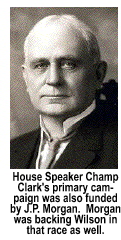 It
happened during the Election of 1912 when the Money
Mafia backed every major candidate—and engineered the win of
John Pierpont Morgan's "hip pocket" candidate, New Jersey
Governor Thomas Woodrow Wilson by financing a third party run by
former President Teddy Roosevelt specifically to drain votes from
President William Howard Taft. Multiple polls taken in the spring
of 1912 showed that Taft would easily win reelection in a 55% to
45% race against Wilson.
It
happened during the Election of 1912 when the Money
Mafia backed every major candidate—and engineered the win of
John Pierpont Morgan's "hip pocket" candidate, New Jersey
Governor Thomas Woodrow Wilson by financing a third party run by
former President Teddy Roosevelt specifically to drain votes from
President William Howard Taft. Multiple polls taken in the spring
of 1912 showed that Taft would easily win reelection in a 55% to
45% race against Wilson.
Morgan financed the primary campaign of House Speaker James Beauchamp "Champ" Clark [D-MO] who ran against, and came close to beating, Wilson for the Democratic nomination. That was the only part of the campaign Morgan could not control. Since 1912, Congress has enacted enough campaign laws to penalize the non-incumbent that it is now much harder for a challenger to get on the ballot, raise money, and campaign effectively on an even playing field because the even playing field does not exist. That's why most serious challengers wait until an incumbent dies or retires before launching a serious campaign for that individual's seat in Congress.
In 1906, the money barons orchestrated what the media branded as the "Bank Panic of 1907." It was an entirely man-made financial crisis (just like the Bank Crisis of 2007) that was engineered to justify the creation of the Federal Reserve System, and the enactment of the 16th Amendment. Engineered by Morgan, it would be the first of many engineered crises that politicians would "not let go to waste."
Republican social progressive
Teddy Roosevelt hand-picked his successor, Secretary of War William
Howard Taft instead of his Vice President, Charles Fairbank
in 1908. Roosevelt believed Taft was a likeminded social
progressive. 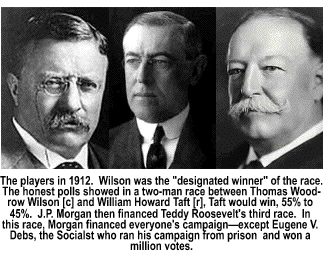 He
was convinced that Taft would support the enactment of a Constitutional
Amendment to create a modest income tax, and another Amendment to remove
the dollar from the gold standard. That would allow the private bankers
who would own the stock in the planned central bank (necessitated by the
Bank Panic of 1907) to create an elastic dollar not tied to gold
or silver. Morgan backed Taft, and in 1908, Taft
won. Morgan would not back him in 1912 because Taft, like
every President from Thomas Jefferson to Taft (with the
exception of Jacobin Republican Abraham Lincoln and social progressive
Republican Theodore Roosevelt) opposed the efforts of the money
barons to create a permanent, privately-owned central bank in the United
States. Morgan, who was never popular with the American people,
publicly endorsed Taft and made certain the media knew he was financing
Taft's reelection bid as he quietly financed both Wilson
and Roosevelt.
He
was convinced that Taft would support the enactment of a Constitutional
Amendment to create a modest income tax, and another Amendment to remove
the dollar from the gold standard. That would allow the private bankers
who would own the stock in the planned central bank (necessitated by the
Bank Panic of 1907) to create an elastic dollar not tied to gold
or silver. Morgan backed Taft, and in 1908, Taft
won. Morgan would not back him in 1912 because Taft, like
every President from Thomas Jefferson to Taft (with the
exception of Jacobin Republican Abraham Lincoln and social progressive
Republican Theodore Roosevelt) opposed the efforts of the money
barons to create a permanent, privately-owned central bank in the United
States. Morgan, who was never popular with the American people,
publicly endorsed Taft and made certain the media knew he was financing
Taft's reelection bid as he quietly financed both Wilson
and Roosevelt.
When the election results
came in at the end of the day, Taft, who was a shoo-in for reelection
with 55% of the vote before the media portrayed Taft as "Morgan's
man," received 23.2% of the vote. 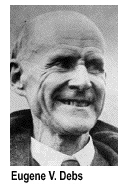 Spoiler
Roosevelt took 27.4% of the vote, and Wilson, who was projected
to lose with 45% of the popular vote, won 435 electoral votes, and the
White House, with 41.8% of the vote. The only candidate in the Race of
1912 not financed by Morgan was Socialist Eugene V. Debs who
ran his presidential campaign with no money—from prison. Debs
took 901,551 votes or 6% of the vote. Presidential politics changed forever
during the Election of 1912. And, sadly, so did America. The United States
lost its virginity that year after being successfully gang raped by the
princes of industry and the barons of banking and business.
Spoiler
Roosevelt took 27.4% of the vote, and Wilson, who was projected
to lose with 45% of the popular vote, won 435 electoral votes, and the
White House, with 41.8% of the vote. The only candidate in the Race of
1912 not financed by Morgan was Socialist Eugene V. Debs who
ran his presidential campaign with no money—from prison. Debs
took 901,551 votes or 6% of the vote. Presidential politics changed forever
during the Election of 1912. And, sadly, so did America. The United States
lost its virginity that year after being successfully gang raped by the
princes of industry and the barons of banking and business.
On Dec. 23, 1913, Woodrow Wilson kept the promise he made to Morgan while serving as the President of Princeton University in 1907, which led to his meteoric rise in American politics. He signed the Federal Reserve Act of 1913 into law. When the Morgan-orchestrated Bank Panic of 1907 occurred, Princeton President Wilson—with a scholastic reputation as an economist—granted an interview to a local newspaper reporter where he was quoted as saying: "All this trouble..." (the financial crisis triggered by Morgan's meddling with Knickerbocker Banks) "...could be averted if we appointed a committee of six or seven public-spirited men like JP Morgan to handle the affairs of our country." Reading Wilson's interview was a Morgan hireling named Edward Mandell House. (This view is supported by the political neophyte Wilson in his social progressive book, "New Freedom," which was written on the advise of Morgan to launch Wilson's presidential bid. It was published shortly before the Election of 1912.)
From 1912 on, the princes of industry and the barons of banking and business knew they could virtually control the outcome of any presidential election with a large degree of certainty. The methodology which has evolved is pretty much the same from election cycle to election cycle. It begins with "media testing" to determine the viability of designated winner (and the designated loser) as well as the public's sentiment of what will become the key issues for the race. War is always good. So are food prices. And, of course global warming or cooling (separate or combined since the ecoalarmists have discovered they can blame global cooling on global warming and visa versa. That's the nice thing about fiction, you can shape it anyway that works for you). But, you get the idea.
Once the PR firms hired by the money barons define the demographics of the candidates and the issues they will manipulate to drive emotions during the race, they are now in the drivers' seat. If 'Candidate A," the designated loser (in the primary election of, say, 2008) is viewed too favorably by potential voters (let's call him former Gov. Mitt Romney [R-MA] simply for the lack of a better name), and the designated winner of the primary, "Candidate B," (let's call him Sen. John McCain [R-AZ]) is too much a Rockefeller Republican to win the nomination without help, then the manipulators know they need to encourage other conservative candidates to enter the fray to split the votes that would otherwise go to the candidate most representative of the political views of the voters. In other words, "more" is not always better.
Let's say that the very honest, tell-it-like-it-really-is private polls show "Candidate A" polling between 60% to 65% in the moderate to conservative States and "Candidate B" polling about 30% in the same States. Without help, "Candidate B" is a loser waiting for his pink slip from the voters. But, standing off in the wings of the center stage is the media, watching the wanabees test the political waters with baited hooks, waiting to see if the big barracuda donors will nibble at the bait.
The barracudas—the barons of banking and princes of industry—have already polled those who they view as viable and, they have already decided who the real players are on both sides of the political spectrum. And, for the most part, they've also already picked the spoilers they will use to guarantee that "Candidate A" and "Candidate B" (the presidential race's designated winner and loser emerge from the primaries unscathed.
When the primary takes place, this is what happens. "Candidate B" takes his expected 30% of the vote. Candidates A-2 and A-3 each take 6% of the vote while Candidates A-4, A-5 and A-6 each take 10% of the vote. Remember, in a two-man race, "Candidate A" easily and handily, wins. In a 7-man race, "Candidate B" wins with 30% and "Candidate A" loses with 28%. Five spoilers siphon off 42% of the total vote that would largely have gone to "Candidate A," altering the outcome of the primary. As long as someone is funneling campaign money to the spoilers, they will remain in the race, And, they will change the outcome of the general election by changing who gets to grab the gold ring. And, you thought the voters picked the candidates. Silly you. How could you possibly believe that? If that happened, you would actually have a voice in government. Do you feel like you have a voice in government?
Only one 20th century presidential race comes to mind where the Money Mafia could not jury-rig the primaries, usurp the will of the people, and eke out a victory for their planned "designated winner." It happened in the Election of 1980. The barons of banking picked former Republican National Committee Chairman and former Ambassador George HW Bush as their designated winner. The American people had a different winner in mind. The people's choice in 1980? Former California governor Ronald Reagan. And, regardless how the princes of industry tried to manipulate public opinion, the honest polls continued to suggest that Reagan would win. The solution? More candidates to dilute Reagan's vote-getting charisma in order to help Bush win the early primaries. The consensus was if Bush picked up enough delegates early-on, the media would be able to convince the masses that since Bush would prevail, the American people should get behind him and help generate the momentum he needed to ultimately prevail against Jimmy Carter in November.
Like the Republican field
in 2008, eight Republicans jumped into the fray of 1980 to help Bush
beat Reagan. Draining votes from Reagan in the early primaries
were Senate Minority Leader Howard Baker [TN], Rep. John
B. Anderson [IL], Rep. Phil Crane [IL]. Gov. John Connally
[TX], Gov. Harold Stassen [MN], Sen. Bob Dole [KS], Ambassador
Ben Fernandez [CA] and Sen. Lowell Weicker [CT]. (On the Democratic
side, Sen. Ted Kennedy [MA] and Gov. Moonbeam (Jerry
Brown) [CA] competed against Jimmy Carter. 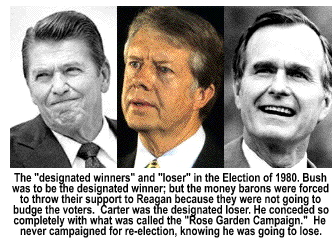 Carter's
Secretary of State, Ed Muskie [ME] ran as a spoiler to drain primary
votes from Kennedy. Carter was easily renominated. He was,
after all, the "designated loser" in the Election of 1980. Knowing
he was expected to lose, Carter didn't even waste any time campaigning.
Carter's
Secretary of State, Ed Muskie [ME] ran as a spoiler to drain primary
votes from Kennedy. Carter was easily renominated. He was,
after all, the "designated loser" in the Election of 1980. Knowing
he was expected to lose, Carter didn't even waste any time campaigning.
Bush won the New Hampshire primary. Although Reagan handily won New Hampshire in 1976 against President Gerald Ford, he barely "showed" in 1980, dragging up behind Bush, Baker, Anderson (who came in third), Crane and Dole. Reagan placed 6th in a field of 9 candidates. Bush continued by beating Reagan in the Iowa Straw Poll. Before the tide turned against him, Bush won five primaries. Reagan ultimately won 29. Had the American people not stuck to their guns, George HW Bush would have become the 40th President of the United States. After Reagan swept the South, the barons of banking threw their support behind him, with Reagan agreeing to put Bush on his ticket.
Now its time to look at the political figures being touted by the media as this season's "early frontrunners" for the presidential race of 2012—and those ignored because they could actually win the nomination and the election. The CPAC straw poll gave us an indication of the 2012 spoilers. Fox News commentator and former Arkansas governor Mike Huckabee still leads the spoiler pack. He's followed by Congressman Ron Paul who is too polarizing to be considered a viable candidate. Then, we have virtually unknown Indiana governor Mitch Daniels, and equally unknown New Mexico governor Gary Johnson. Minnesota governor Tim Pawlenty, who claims to be "testing the waters" has already bought his scuba gear and is committed to the deep swim. Mississippi governor Haley Barbour who, although he is a former well-known and powerful DNC head, is also virtually unknown today outside his Southern base. His funding will come from those who finance the spoilers. Gingrich needs the South to win. Those votes will go to Mitt Romney or, if he officially enters the race, Sen. Jim Demint. Demint's problem (or perhaps appeal) is that he is a Romney-clone without the Morman brand.
Then we have former Senator Rick Santorum who has no reason to be in the race except for a shot at the number two slot. Santorum drains votes from Romney, so he's good for Gingrich. The one person who did not fit in the Race of 2012 was Congressman Mike Pence, a lifetime advocate for limited government—and for fiscal restraint. As the media touted him as a "runner," Pence made it clear in a press conference in Indianapolis on Jan. 28, 2011 that he was bowing out of the presidential race. Pence has his sights on the governor's mansion. Daniels, who is testing the presidential waters and is the current governor, is prohibited by State law from seeking a third consecutive gubernatoral term. While Pence is the clear frontrunner for Daniel's job, I'd much rather see him take on Rockefeller Republican Sen. Richard Lugar in 2012. Before he ran for Congress in 2000, Pence told then Indiana Republican Party Chairman Mike McDaniel that he thought he could accomplish more for the people of Indiana as governor than he could in Congress. Mitch Daniels, on the other hand, feels he is walking in his great-great grandfather's footsteps, William Henry Harrison, the 9th President of the United States. . He is also descended from Benjamin Harrison, one of the signers of the Declaration of Independence. Daniel has a rich political ancestry, but that's not enough to qualify him to win the GOP nomination, or the general election—particularly when the GOP candidate will be running against a man who [a] is very likely not a citizen of the United States and, therefore, not eligible to seek the office he holds, and [b] someone who proved in 2008 that he's not opposed to stealing the votes he can't win in the voting booth.
![]() Sen.
John Thune of South Dakota, who lacks the star quality needed to raise
the millions of dollars he would need to win, will likely be among the
first wanabees to drop out of the race—if he officially enters the
fray. New Jersey governor Chris Christie, a former US Attorney
(appointed by George W. Bush) and a former lobbyist (whom the media
is trying hard to force into the campaign), has repeatedly said he is
not a candidate. The only thing he has not said is "...if nominated,
I will not run; if elected I will not serve." That, of course,
is stupid since when it comes to the White House gold ring, even the non-runners
are running. They just aren't spending any money to do it.
Sen.
John Thune of South Dakota, who lacks the star quality needed to raise
the millions of dollars he would need to win, will likely be among the
first wanabees to drop out of the race—if he officially enters the
fray. New Jersey governor Chris Christie, a former US Attorney
(appointed by George W. Bush) and a former lobbyist (whom the media
is trying hard to force into the campaign), has repeatedly said he is
not a candidate. The only thing he has not said is "...if nominated,
I will not run; if elected I will not serve." That, of course,
is stupid since when it comes to the White House gold ring, even the non-runners
are running. They just aren't spending any money to do it.
But, with Christie appointing a Muslim immigration attorney, Sohail Mohammed, to a State court judgeship in Passaic County, he may find his support for reelection as governor iced-over even before the primaries for the Election of 2012 heat up. Mohammed handles radical Muslim clients like Imam Mohammed Qatanani, head of one of New Jersey's largest mosques. When he applied for a green card in the United States, Qatanani failed to disclose that he is a member of Hamas, and that he was convicted in Israel of providing support to a terrorist group. What's more, the Bush-43 appointed US Attorney battled the Department of Homeland Security to protect Qatanani from deportation, and had one of his top lieutenants testify for Qatanani during his first deportation hearing. Christie has since appointed that lieutenant, Assistant US Attorney Charles McKenna, as the head of New Jersey's Homeland Security.
And, we have 2008's political star, Sarah Palin, whose star has eclipsed. Palin, who was easily my choice for 2012 in 2008, soured me when she joined the GOP establishment elites in 2010 by renouncing what I saw in 2008 as true, uncompromising conservatives values. Palin joined the establishment politicians in 2010 by backing pseudo-Republican Senator John McCain's reelection bid against Senate challenger and former Arizona US Congressman J.D. Hayworth. It may well be that Palin's fifteen minutes of fame are about over. Perhaps her wisest course of action would be to move to Idaho and reincarnate Helen Chenweth-Hage. As a Congresswoman—a broker for the people of her State—I think Palin would be an effective voice. Make her a part of "establishment Washington" and I'm not sure I trust her to put the people first.
The final spoiler in the
banking barons' cakewalk to Newt Gingrich's nomination next fall
is Sen. Jim Demint [R-SC]. Now we have what currently the cast
of players—except perhaps Wisconsin Gov. Scott Walker who
is currently engaged in a battle with Democrats to curb union collective
bargaining rights for public employees. Adding to that, Walker
also expects all State employees to pay a larger share of their healthcare
and pension fund costs. Both chambers of the Wisconsin legislature are
controlled by the GOP. 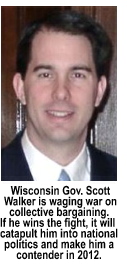 Out
of 99 Assemblymen, the GOP controls 56 seats. When the minority Democrats
in the Wisconsin State Senate (14 Democrats verses 19 Republicans) could
not stop a vote on the measures from a floor vote on Feb. 17, all 14 Democratic
Senators left the State and holed up in a motel in Rockford, IL so Capitol
Police could not take them into custody and return them to the legislature
to vote on the measure. The Wisconsin Assembly was scheduled to vote on
the collective bargaining issue on Fri., Feb. 18. To schedule the vote,
at least one Democrat must be present in both chambers of the legislature
when the vote takes place. If Walker, a still wet-behind-the-ears
first term governor and son of a preacher, who came to State prominence
as the head of Milwaukee County's Executive Board when he gave back the
majority of his pay to the County, pulls off his political coup and strips
the labor unions of much of their clout in the State, he will be catapulted
into the top tier of potential presidential candidates for 2012—before
he barely gets his feet wet in Wisconsin.
Out
of 99 Assemblymen, the GOP controls 56 seats. When the minority Democrats
in the Wisconsin State Senate (14 Democrats verses 19 Republicans) could
not stop a vote on the measures from a floor vote on Feb. 17, all 14 Democratic
Senators left the State and holed up in a motel in Rockford, IL so Capitol
Police could not take them into custody and return them to the legislature
to vote on the measure. The Wisconsin Assembly was scheduled to vote on
the collective bargaining issue on Fri., Feb. 18. To schedule the vote,
at least one Democrat must be present in both chambers of the legislature
when the vote takes place. If Walker, a still wet-behind-the-ears
first term governor and son of a preacher, who came to State prominence
as the head of Milwaukee County's Executive Board when he gave back the
majority of his pay to the County, pulls off his political coup and strips
the labor unions of much of their clout in the State, he will be catapulted
into the top tier of potential presidential candidates for 2012—before
he barely gets his feet wet in Wisconsin. 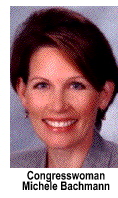 Does
that remind you of Palin in Alaska in 2008? So, while you might
think the GOP dance card is full, there are still a few open slots left
for spoilers to dilute the the vote-getting capacity of the designated
losers.
Does
that remind you of Palin in Alaska in 2008? So, while you might
think the GOP dance card is full, there are still a few open slots left
for spoilers to dilute the the vote-getting capacity of the designated
losers.
Congresswoman Michele Bachmann [R-MN] who, in my mind, has taken Palin's star and could exchange it for the gold ring at the end of the presidential rainbow. In a GOP primary campaign where you have a field of 12 competent conservatives vying against one left-of-center liberal posing as a constitutional conservative, and a token pizza maker, the end game is as predictable as the outcome of 2008. Gingrich wins the nomination, Barack Obama is reelected. Yet, Mitt Romney is still the hands-down favorite in the Gallup Poll (of likely conservative voters). The poll, taken two weeks after the Election of 2010 showed if the 2012 election had been held on Nov. 14, 2010, Romney would have won 19.5% of the vote. Palin would have come in second with 15%. Huckabee would have come in third with 14.5%. Gingrich would have come in fourth with 11.5% and Ron Paul would have come in fifth with 5.5% of the vote. Throw them into a primary, and Romney, Palin, Huckabee, Ron Paul and the other 8 conservatives vying for primary votes will dilute each other, giving the primary vote victories to Gingrich—with 30% or less of the vote—giving America a repeat of McCain's win, and America's loss, in 2008.
But, what surprises me even more than the right accepting the left's choices and running with them, is the fact that conservative voters just don't ever seem to get it. They are duped into backing too many candidates, which allows the princes of industry and barons of banking and business to siphon off enough votes from the best candidate that "their man" (whether he's the designated winner or the designated loser) gets the nomination. Once their hand-picked Republican and their hand-picked Democrat wins their party's nomination, the money barons control the outcome by manipulating the media attention given to the third party "spoilers." Usually the third party candidates get no media attention to "legitimatize" their candidacy. When the media gives credibility to their candidacy, they become players in the game on the street. In 2008, the player on the street was Mike Huckabee. As long as Mitt Romney remained in play so did Huckabee. When Romney pulled out of the race, it became a two-man race between Huckabee and McCain. Huckabee thought he could leverage the 278 delegates and 8 States he won for the vice presidential slot on a McCain-Huckabee ticket. Huckabee did not quit the race until his delegate count exceeded Romney's.
National politics is a shell game that only the Democrats appear to have mastered. Conservative voters are usually the "marks" that get conned when the political hucksters whip out the walnut shells and the elusive red pea under the shell almost always turns blue when the game starts. Unlike their liberal opponents whose voting habits are largely orchestrated by Big Labor, conservative voters are more far more politically factionalized and pick their candidates based on a "foot of the cross" principle that is based on personal likes and petty biases. Which is why conservatives are so factionalized; and why the Democrats are smart enough to limit presidential players to a manageable level while conservatives believe that marginalized candidates with limited appeal can win elections.
The Election of 2012 will be the most important presidential election in United States history. Because this election determines whether or not the United States continues to exist as a first world nation. If the conservative voters continue to encourage dozens of wanabees to vie for the GOP nomination instead of one or two truly qualified, truly electable candidates with whom the voters may not agree with on 100% of the issues, the princes of industry and the barons of banking and business will continue to pick the winners—and the United States will become an Islamo-communist nation governed by Sha'ria law. I don't know about you, but I am getting increasingly tired of the rhetoric of those suffering from "perfect candidate syndrome" (since Jesus is not running in any election of which I'm aware). There are no perfect candidates; nor are there any perfect voters. We are imperfect creatures in an imperfect world. Because we demand perfection of those who represent conservative Christians and/or secular conservatives, we generally come up with the short straw. And, the short straw is getting even shorter.
If we had the brains of the left and the moral character of the right, we would pick one, but no more than two, candidates—the most electable ones—and get behind the one with whom we best agreed. Remembering that Democrats outnumber both Republicans and Independents combined, we would recognize the fact that polarizing candidates that win straw polls might win the Republican nomination, but they can't win elections simply because, to win, Republican candidates must pull Democratic votes.

Copyright © 2011 •Jon Christian Ryter.
All rights reserved.


